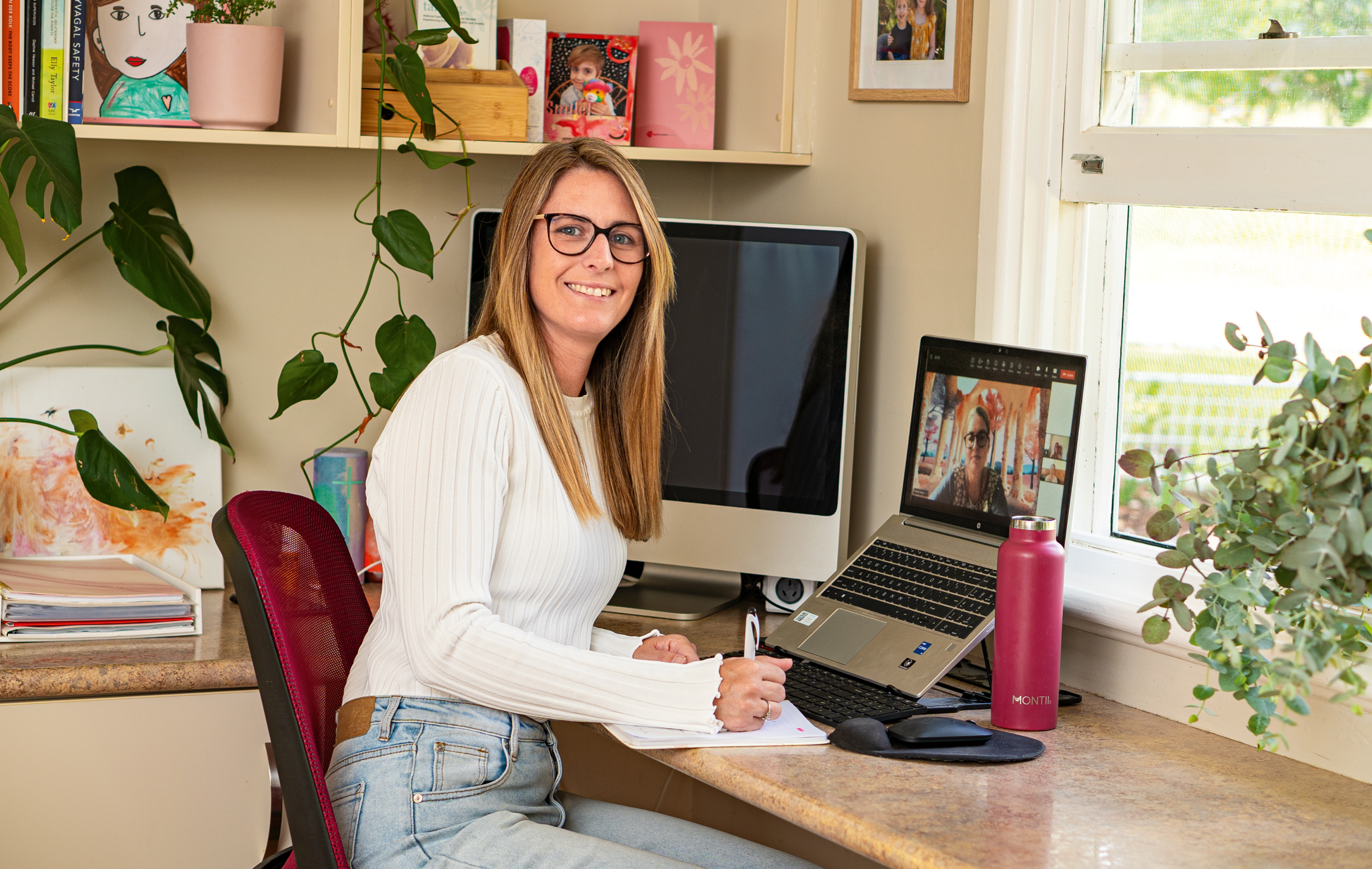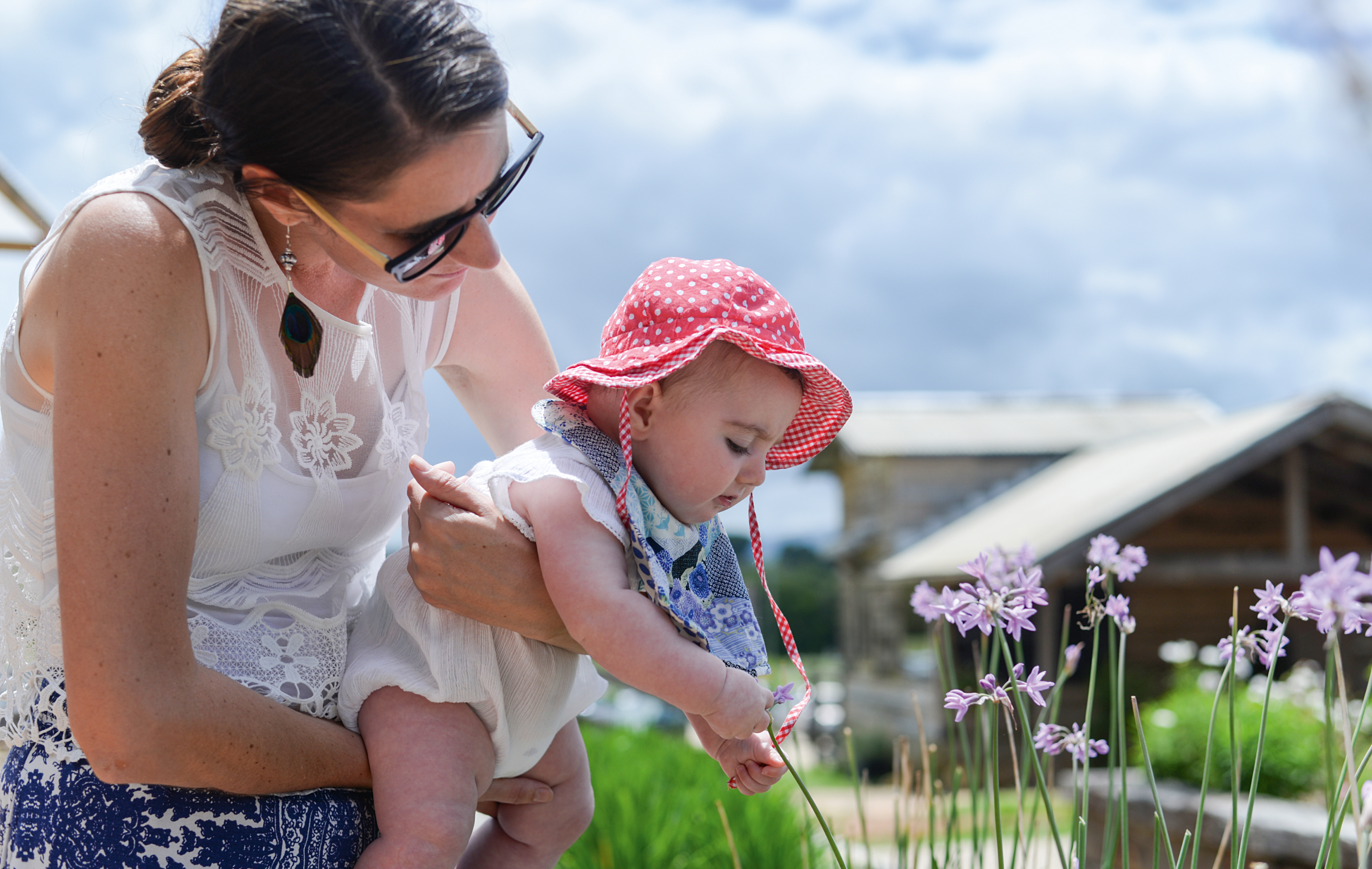
Katie Peterson works from home in Moonbi, NSW, for the Gidget Foundation.
Support for new parents
Katie Peterson is a clinical psychologist and Tamworth-based mother who’s passionate about perinatal mental health.
STORY + PHOTOS KATE NEWSOME | OUTBACK MAGAZINE
It’s morning in the quiet village of Moonbi, just north of Tamworth, NSW, and Katie Peterson has finished her mindfulness meditation. As her partner is dropping off their 2 kids at school and daycare, she is enjoying a moment of peace and quiet before she sees what challenges the day has in store.
Like many others who work from home, the rigmarole of emails, phone calls and online meetings will start at 9am sharp. It doesn’t matter so much where Katie sets down her coffee and cracks open her laptop – whether she’s at her kitchen counter, bedroom nook, or on her living room lounge – those on the other side of her screen know that she’ll be there to help them, wherever they are in Australia.
Offering a unique perspective as a regionally based mother and clinical psychologist, Katie is one of 2 clinical team leaders at Gidget Foundation Australia. Through consultation and supervision, she provides guidance to the foundation’s practising clinicians to help them, in turn, support their allocated clients.
The mission of the Gidget Foundation is to support new and expectant parents across the country. They focus on the perinatal period, from conception through to around 12 months postpartum. It’s a time of unprecedented and innumerable challenges, from changes in lifestyle, identity, hormones and sleep schedules, to potential experiences of birth trauma, isolation and loneliness, health complications, or navigating assisted reproduction or perinatal loss.
Access to specialist mental-health support throughout this period is critical, particularly where risk factors for regional and rural-based Australians – including limited access to services – compounds what is, as Katie says, “already a really hard time”.
Gidget was the nickname of a young mother who tragically took her own life while experiencing postnatal depression. Honouring Gidget’s memory, the not-for-profit was founded by her family and friends determined to support others. Perinatal mental health covers a spectrum of conditions, the seriousness of which cannot be understated. Perinatal depression and anxiety continue to impact approximately 100,000 Australians each year, and maternal suicide remains the leading cause of death for expectant and new mothers.

Katie Peterson with her daughter, Eyda, when she was 6 months old.
Katie found her passion for perinatal mental health when she was fresh out of uni. Born and raised in Tamworth, she had just finished her master’s degree when the opportunity came up to work with a St John of God Health Care outreach team led by perinatal psychiatrist Professor Bryanne Barnett. “I was really lucky to just get completely immersed in that and learn from the best. But then I had my own children so it kind of changed everything again,” Katie says. “You’re no longer working with theory; you have a lot of empathy for understanding the reality of being a parent.”
Katie had to be flown out of Tamworth via air ambulance when her son was born prematurely at 34 weeks. The experience has had a long-lasting impact on her work and understanding of the challenges faced by young mothers, she says, as well as by rural and regional families generally when they need specialist medical care.
As a practising psychologist, Katie had been referring clients to Gidget for years when the role was advertised. “When I saw the position I thought, ‘Wow! Imagine if I could work from home. Imagine if I could work for this amazing organisation, and actually just challenge myself.’”
The clinical team leaders are involved in every part of the organisation: mentoring and supervision; coordinating online programs; supporting admin, marketing, client services and intake teams; and managing some 140 clinicians who work for Gidget nationwide, both remotely via telehealth appointments and face to face at the foundation’s physical sites known as Gidget Houses. A critical part of Katie’s role is supporting clinicians when clients are in crisis or need to access other services beyond the scope of the Gidget Foundation and its 10-session Medicare model.
While Katie continues to work part-time at the Gidget Foundation, she decided to go back to a day of clinical work within Tamworth every week or so. “Because I’m not doing direct client work in this role [at Gidget], I thought I would do some private practice as a way of supporting the local women. As much as women are struggling and it is hard, you know, it still is really nice to work with women and their babies.”
Katie is one of the few people to have a leadership position at the foundation based outside Sydney. She brings a unique perspective and will be speaking at the Inaugural Motherland National Conference in March 2024.
“For people in regional and rural areas, it’s important for them to know that help is available, and that telehealth is effective. The earlier you seek help, the better the outcome will be for people. They’re not alone.”
See your GP for a referral to access Gidget services. Visit gidgetfoundation.org.au or phone 1300 851 758